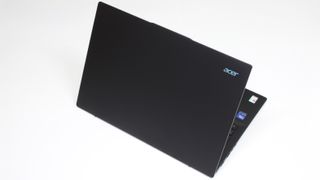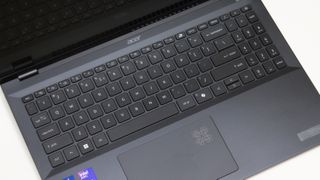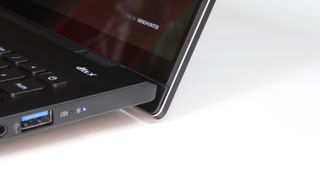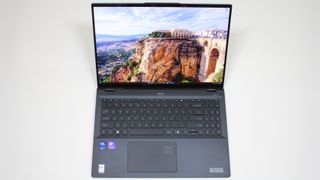Physical Address
304 North Cardinal St.
Dorchester Center, MA 02124
Physical Address
304 North Cardinal St.
Dorchester Center, MA 02124

Having previously reviewed Acer’s 14-inch Swift AI, I thought I knew what to expect from the 16-inch model: similar processor, similar performance, better display, and lower battery life. I thought I would have the same experience with its keyboard, touchpad, and speakers, too. But even after reviewing laptops for over six years, subtle differences between the same laptop in different sizes still catch me by surprise.
I wasn’t surprised that its Intel Core Ultra 200-series processor lacked heavy multitasking “oomph,” or that the laptop had a shorter battery life. I also wasn’t surprised the keyboard stretched my fingers to their limit (as do most 16-inch laptops). But I give Acer a Kudos bar for stepping up the Swift 16 AI’s audio and display, something I didn’t expect.
The best way I can describe this laptop: I would wholeheartedly accept it as a gift, but it’s not one I’d purchase for myself — not for over $1,000.
| Price: | $1,199 |
| CPU: | Intel Core Ultra 7 256V |
| GPU: | Intel Arc 140V integrated graphics |
| RAM: | 16GB |
| Storage: | 1TB SSD |
| Display: | 16-inch (2880 x 1800) 120Hz OLED touchscreen |
| Battery (HH:MM): | 12:57 |
| Dimensions: | 14.0 x 9.8 x 0.39 inches |
| Weight: | 3.5 pounds |
Click to view full benchmark test results
| Header Cell – Column 0 | Acer Swift 16 AI (Intel) |
|---|---|
| Geekbench 6 (Higher is better) | 10,951 |
| Handbrake conversion (Lower is better) | 7:55 |
| SSD Transfer rate (Higher is better) | 1927.8 MBps |
| Heat (Degrees Fahrenheit) | 87.6 |
| Battery life (Higher is better) | 12:57 |
| Display brightness (Higher is better) | 384 |
| sRGB color gamut (Higher is better) | 196% |
| DCI-P3 color gamut (Higher is better) | 139% |
| Color accuracy (Lower is better) | 0.3 |
| Sid Meier’s Civ VI: Gathering Storm (1080p) | 50.8 fps |
The $1,199.99 model I reviewed is configured with an Intel Core Ultra 7 256V, integrated Intel Arc graphics, 16GB of RAM, and a 1TB SSD. The 16-inch display is damn sharp thanks to its high resolution (2880 x 1800) and vivid OLED panel. It’s also a touch screen, which is a nice bonus (and as of writing, this laptop is on sale for $899.99).
There are several other Swift models with either an Intel, AMD, or Qualcomm processor. On the Intel side, there are two 14-inch Swifts, one with a Core Ultra 7 258V, 32GB of RAM, a 1TB SSD, and an IPS touchscreen for $1,299.99. The other comes with a Core Ultra 7 256V, 16GB of RAM, the same amount of storage, and the same display for $1,199.99.
The base AMD model starts at $1,199.99 and is configured with a Ryzen AI 9 365, Radeon 880M integrated graphics, 16GB of RAM, a 1TB SSD, and a 14-inch, 1920 x 1200 IPS touchscreen. The $1,299.99 model has the same hardware but comes with 32GB of RAM.
Finally, there’s the 14.5-inch Qualcomm model starting at $1,049.99. Two configurations have a Snapdragon X Plus X1P-64-100 chip, Adreno integrated graphics, 16GB of RAM, a 1TB SSD, and a 2560 x 1600 IPS display. (The touchscreen version costs $50 more.) The $1,649.99 model has the same specs but comes with a touch display, a Snapdragon X Elite X1E-78-100 chip, and Windows 11 Pro instead of Home.

The 16-inch Swift — surprise — looks pretty much the same as the 14-inch Intel version, aside from having a larger chassis, of course. There’s a silver Acer logo etched into the top right corner of the lid that reflects light like a prism. The chassis is a gorgeous, subtle metallic black that changes to gray under bright light. (I‘ve been jokingly calling it “a goth laptop that smiles.”)
Not a fan of how the chassis’ edges feel when I hold the laptop horizontally in one hand, though; if you’ve ever run an old-school wooden ruler with a metal edge over your fingertips, they feel a lot like that. Now imagine that ruler weighs over three pounds. That’s what it felt like digging into my fingers. Not painful, but uncomfortable.
There are nine, one-and-a-half-inch vent sections on the underside spanning most of its width, and one long, skinny vent wedged between the display’s bottom bezel and the top of the keyboard. It’s not noticeable unless you go looking for it, but it looks like a vent you’d see on a gaming laptop: much smaller, but still aggressive looking, like it was built to expel a lot of heat.
Acer squeezed in a full numpad on the keyboard, but it’s not as cramped as some I’ve used on other 16-inch laptops (the keys are still tiny, though). The touchpad is 3 inches wide and nearly 5 inches long — same size as the Swift 14 AI’s, so it feels smaller on this laptop’s larger chassis even though it isn’t. It also has the same-sized notch for the webcam across the top bezel, but it lacks a privacy shutter.
It has interesting proportions compared to some of its competitors, though: 14.0 x 9.8 x 0.39 inches, 3.5 pounds. So, the Swift 16 AI is thinner than its rivals, but slightly heavier, and yet still feels a tad bulky by comparison because of its length.
Here’s how it compares to some of the best 16-inch and touchscreen laptops:
I’ve reviewed a lot of 16-inch laptops with port after port stuffed into the side of their chassis, so it was a little disappointing to see the Swift 16 AI come without an Ethernet port or a microSD slot. (Given the chassis’ thinness, I can understand leaving out the Ethernet port, though.)
If all that is enough for you, awesome! If not, there’s always time to pick up a great USB-C hub or laptop docking station.
The Swift 16 AI’s battery life fell just short of 13 hours (12 hours, 57 minutes) in our battery run- down test. But with display brightness set between 250 and 300 nits (much higher than Laptop Mag’s 150-nit test setting), I was still able to use it for a full day’s worth of work: 8 hours of writing emails, writing articles, grading my students’ work, and getting way too distracted by cat videos on YouTube.
By evening, it had about 1-2 hours left of battery life, but hey, a girl’s gotta do what she can to get rid of as much OLED display glare as possible. (More on that coming up.) But 13 hours is way, way shorter than the “up to 29 hours of multi-day battery life” Acer claims on its website. While that was for a video playback test, much less intensive than our test, they claimed 23 hours for even a web browsing test, so while the battery life is by no means bad, it is slightly disappointing.
Its battery lasts longer than some of its competitors, but not all. Check out the chart below:
Click to view chart data in table format
| Header Cell – Column 0 | Acer Swift 16 AI | MSI Prestige 16 AI Evo | Asus Zenbook S 16 | HP Spectre x360 16 (2024) |
|---|---|---|---|---|
| Battery life (Higher is better, HH.MM) | 12:57 | 13:04 | 11:35 | 11:07 |

The Swift’s OLED display is by far its best feature. I binged many episodes of A Discovery of Witches on this laptop over the last week, so it didn’t come as a surprise when our test results showed it’s not only color accurate, but also covers an extremely wide range of the DCI-P3 color gamut.
I’m a sucker for old libraries and old pubs, and that show’s first season has many scenes in those locations. The laptop’s display showcased the Bodleian Library’s warm lighting, reflecting it off the rich, dark wood of shelves and desks in a way that made me nostalgic for the year I spent living and studying abroad. The pub scenes felt the same way too, especially with natural light pouring through a window.
The only thing that ruined all those lovely pub and library scenes was the dreaded OLED glare. One of the best things about A Discovery of Witches is its moody and spooky lighting, but instead of staring into a dark abyss when a main character’s life hung in the balance, I was staring back at my reflection. The best (and only) way I got around that was by turning off all the lights in my room. (Extra spooky.)
Unfortunately, that’s a common drawback to glossy screens, but if the OLED panel had been brighter, it would have helped a lot. Though compared to some of its rivals, it is brighter.
Click to view chart data in table format.
| Header Cell – Column 0 | Acer Swift 16 AI | MSI Prestige 16 AI Evo | Asus Zenbook S 16 | HP Spectre x360 16 (2024) |
|---|---|---|---|---|
| Display brightness (Higher is better) | 384 | 368 | 458 | 376 |
| sRGB color gamut (Higher is better) | 196% | 194.70% | 112.60% | 123% |
| DCI-P3 color gamut (Higher is better) | 139% | 138% | 79.70% | 87.10% |
| Color accuracy (Lower is better) | 0.3 | 0.2 | 0.23 | 0.24 |

The keys felt crisper than I expected them to be! It was a pleasant surprise considering the 14-inch Swift’s keys were a fine line between tactile and soft. Not the Swift 16’s keys, which sprung right back up, making a deep but quiet clacking sound with every quick press. It was nice.
Unfortunately, I had the same issue with its keyboard as I have had with nearly every 16-inch laptop I’ve put my tiny hands on; I have to reach further to type. I couldn’t comfortably rest my wrists on the bottom chassis like I can with smaller laptops without touching the top corners of the touchpad and having it think I was trying to perform a gesture.
This slowed down my typing speed. While I’ve achieved upwards of 95 words per minute (WPM) using Monkeytype’s test on other laptops, I only averaged 80 WPM on the Swift 16 AI.
Aside from the sensitive trackpad, it felt the same as I remember on the 14-inch Swift: not perfectly smooth, but I was able to glide my fingertips over it without them catching on the surface.
The Swift’s second-best feature are its bottom-firing speakers. They kept just enough bass in my usual playlist of metal and industrial songs to make me lightly headbang, and kept those lows balanced with the mids and highs. Dio’s voice sounded smooth as he sang “Holy Diver.” I could hear the separate, layered electronic beats and wailing guitars of Combichrist’s “Not My Enemy.”
These speakers are no replacement for a pair of the best headphones, but they ended up sounding better than I expected.

Let’s start with the good: this laptop keeps its cool. In our tests, the warmest it got was 87.6 degrees around the number 5 key, below our 95-degree threshold. The underside stayed slightly cooler, peaking at 77.6 degrees. I was able to keep the laptop in my bare lap for over 15 minutes while performing everyday productivity tasks, too. I did feel a little warm air through the vents every now and again, but only when the fans briefly kicked on to help the processor manage all my multitasking.
Speaking of multitasking — now for the bad. Like the other Acer Swift Intel laptop I recently reviewed with an Intel Core Ultra 200 series chip, this 16-inch Swift couldn’t handle the same amount of open browser tabs and programs as efficiently either. (I’ve previously gone into greater detail as to why if you’re curious.) It became sluggish once I had the Edge browser loaded with dozens of Etsy pages, YouTube videos, articles, my wedding planning spreadsheet (which has become the one tab I never close), and running Slack, Spotify, and Discord at the same time.
The chart below shows just how much slower the Swift 16 AI is in multitasking compared to some of its rivals.
Click to view chart data in table format.
| Header Cell – Column 0 | Acer Swift 16 AI | MSI Prestige 16 AI Evo | Asus Zenbook S 16 | HP Spectre x360 16 (2024) |
|---|---|---|---|---|
| Geekbench 6 (Higher is better) | 10,951 | 13,310 | 13,282 | 12,592 |
| Handbrake conversion (Lower is better, MM.SS) | 7:55 | 05:17 | 5:08 | 7:30 |
| SSD Transfer rate (Higher is better, MBps) | 1927.8 | 1,400.0 | 908 | 1805.5 |
| Heat (Degrees Fahrenheit, 95 comfort threshold) | 87.6 | 98.5 | 106.0 | 99.3 |

Even though this laptop isn’t a gaming laptop, Intel’s integrated Arc graphics are powerful enough to handle some graphically demanding games. Set to 1080p and Medium visual settings, this Swift averaged 50 frames per second (fps) in the Sid Mieier’s Civilization VI: Gathering Storm benchmark, double well over the 30 minimum threshold.
It performed exceptionally well when I played point-and-click games like Potion Craft: Alchemist Simulator and Norco. It even did okay in more graphically intense games like Control, though the laptop struggled to maintain a consistent frame rate even with VSync turned on. At 1200p with all the graphics settings on low, Control averaged 40 to 45 fps if there weren’t too many stationary objects or moving NPCs. If there was, the frame dipped closer to 20 fps.
The same was generally true when I played Palia at 1200p on high settings. If I ran around in Bahari picking mushrooms and chopping down flow trees, the game dipped below 40 fps on occasion. But when I was on my home plot trying to cook in my cluttered, cottagecore kitchen, it struggled to stay above 25 fps.
Here’s an idea of how the Swift 16 AI’s gaming and graphics performance compares to its competitors.
Click to view chart data in table format.
| Header Cell – Column 0 | Acer Swift 16 AI | MSI Prestige 16 AI Evo | Asus Zenbook S 16 | HP Spectre x360 16 (2024) |
|---|---|---|---|---|
| Sid Meier’s Civ VI: Gathering Storm (1080p, FPS) | 50.8 | 66.0 | 63 | 61 |
Copilot+ features (Cocreator in Paint, Restyle Image and Image Creator, Click to Do, and the still controversial Recall) recently started rolling out only to users who are part of the Windows Insider Dev Channel. Microsoft’s Copilot AI companion is currently the only AI feature available to anyone, and was the only AI feature I was able to access on the Swift 16 AI since I am not a part of the Inside Dev Channel.
I had some more fun with the Copilot companion, though, talking about “mindfulness.” It asked me what things I did to practice that, so I told it I broke stuff in rage rooms. (I don’t actually break stuff in rage rooms.) Over our next few interactions, it tried to convince me that I needed to “balance” that with more calming activities. I told it rage rooms were my calming activity.
Then it asked me what sort of stuff I like to break in rage rooms. “Computers,” I said. “How interesting,” it replied. “I just hope you don’t break me!”

I must be blunt: this laptop’s 1440p webcam is disappointing. It accurately captured the colors of all my fridge magnets and my tin signs on the adjacent wall, especially the bottom of the bright red arrow on my “Eat here: it’s cheap and homemade” sign. But under my bright, recessed kitchen lighting, I expected my face to appear much more detailed.
In the photo above, I have no makeup on, and no image enhancements turned on, but my features are blurry in some spots and a little pixelated in others. I can barely make out crinkles at the corners of my eyes, and it’s hard to tell where one strand of hair begins and the other ends in the small tufts of hair sticking out the back of my bun.
The image is serviceable, and anyone would be able to tell that it’s me in the photo, but I expected something better. If you do end up buying this laptop and want the best possible image quality, you’ll need one of the best webcams.
AcerSense is the one app that comes pre-installed on this laptop that you might want to keep around. Instead of digging around in Windows to change the laptop’s power or display settings, or to check up on its overall performance, you can change all that in the app itself.
The other apps (bloatware) you might not want to keep around: Booking.com, Dropbox, Acer LiveArt, two separate DTS sound applications, Intel Unison, and Forge of Empires.
The Swift 16 AI comes with a standard one-year limited warranty.
Like its smaller sibling, the Acer Swift 16 AI can’t handle heavy multitasking as well as its competitors. Its battery life, though long, is still left in the dust by some of its rivals. But there’s something to be said about its vivid and sharp OLED display, speakers, and even its keyboard — and if you are upgrading from a laptop you bought three or more years ago, the Swift’s multitasking performance might be the fastest you’ve ever experienced.
It all comes down to how much you’d be okay with spending on the Swift. I would not spend over $1,000 on it, but if you find it on sale for $850 or less? Okay, now I’m listening.